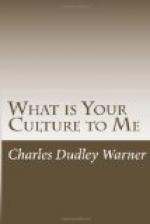What is scholarship? The learned Hindu can repeat I do not know how many thousands of lines from the Vedas, and perhaps backwards as well as forwards. I heard of an excellent old lady who had counted how many times the letter A occurs in the Holy Scriptures. The Chinese students who aspire to honors spend years in verbally memorizing the classics —Confucius and Mencius—and receive degrees and public advancement upon ability to transcribe from memory without the error of a point, or misplacement of a single tea-chest character, the whole of some books of morals. You do not wonder that China is today more like an herbarium than anything else. Learning is a kind of fetish, and it has no influence whatever upon the great inert mass of Chinese humanity.
I suppose it is possible for a young gentleman to be able to read—just think of it, after ten years of grammar and lexicon, not to know Greek literature and have flexible command of all its richness and beauty, but to read it!—it is possible, I suppose, for the graduate of college to be able to read all the Greek authors, and yet to have gone, in regard to his own culture, very little deeper than a surface reading of them; to know very little of that perfect architecture and what it expressed; nor of that marvelous sculpture and the conditions of its immortal beauty; nor of that artistic development which made the Acropolis to bud and bloom under the blue sky like the final flower of a perfect nature; nor of that philosophy, that politics, that society, nor of the life of that polished, crafty, joyous race, the springs of it and the far-reaching, still unexpended effects of it.
Yet as surely as that nothing perishes, that the Providence of God is not a patchwork of uncontinued efforts, but a plan and a progress, as surely as the Pilgrim embarkation at Delfshaven has a relation to the battle of Gettysburg, and to the civil rights bill giving the colored man permission to ride in a public conveyance and to be buried in a public cemetery, so surely has the Parthenon some connection with your new State capitol at Albany, and the daily life of the vine-dresser of the Peloponnesus some lesson for the American day-laborer. The scholar is said to be the torch-bearer, transmitting the increasing light from generation to generation, so that the feet of all, the humblest and the loveliest, may walk in the radiance and not stumble. But he very often carries a dark lantern.




